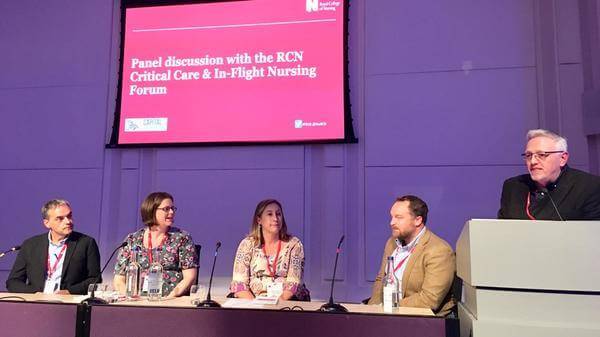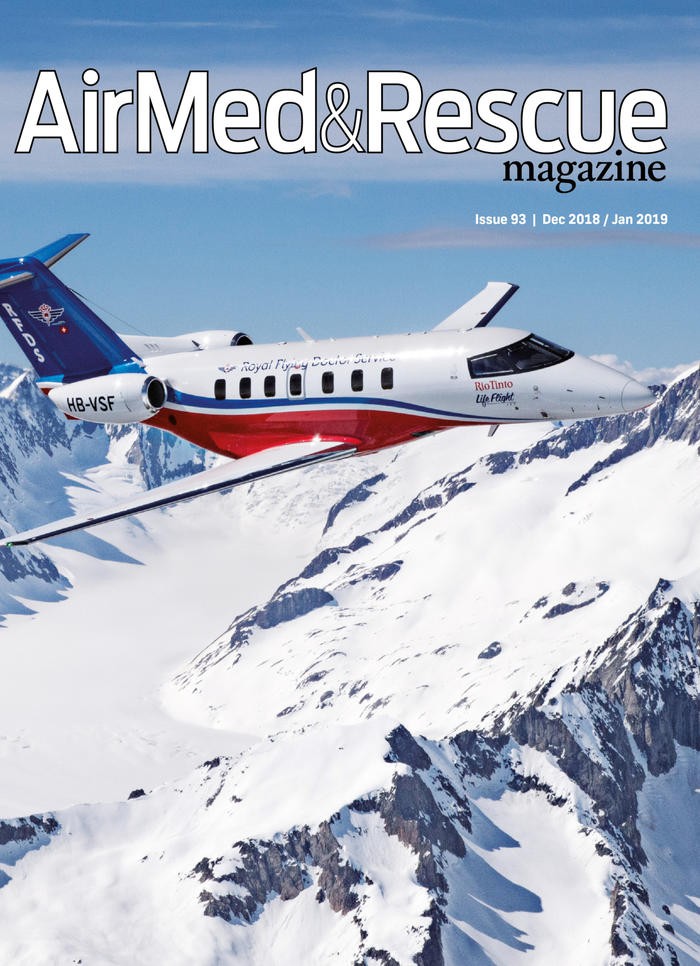Royal College of Nursing Flight Nursing Workshop

Helen Ballantyne, Critical Care and Flight Nursing Forum Committee Member, reports on the Royal College of Nursing Flight Nursing Workshop, which was held in London on 6 October 2018
The Royal College of Nursing (RCN) Flight Nursing Workshop, Fit to Fly: Complex Care in the Air, was a skilfully constructed programme of topics from the RCN Critical Care and Flight Nursing Forum. The RCN forum has 8,800 members, formed with the aim of providing guidance documents; carrying out and supporting research and working with other organisations and governments to develop guidance and policy. In addition, the forum organises conferences and study events to share best practice and provide an opportunity to network with other members working and interested in flight nursing.
A varied agenda
The event successfully negotiated the challenge of accommodating a diverse group delegates who ranged from students to experienced flight nurses and medical officers, and the initial session was a prime example of how this approach worked in practice. Dr Ryan Copeland from International SOS discussed five critical global health trends, air pollution, non-communicable disease, outbreaks, mental health and digitalisation, and in doing so, established the acknowledgment and management of complexity as the key theme for the day. His
insight into the changing demographics of global health offered experienced nurses the opportunity to reflect on their own perceptions of changes
insight into the changing demographics of global health offered experienced nurses the opportunity to reflect on their own perceptions of changeslinked to these trends, while others noted key points to direct their future learning.
Case studies provided by Dr Jude McSharry from Teladoc Health then offered attendees an insight into clinical decision making. He explained that the complexity of a patient’s condition and surroundings, combined with professional agendas from a range of stakeholders, can make the application of evidence-based medicine challenging. His insight emphasised the importance of information gathering, clear communication and the sourcing of expert professional opinion and prompt evacuation to a different provider or country. These points were echoed later when Gayle Falconer outlined the structure of the Military Aeromedical Evacuation team, which led to an interesting reflection on how to maintain practical clinical skills in a highly complex yet variable volume role.
In another demonstration of a complex topic, Dr Stephen Houston from British Airways discussed fitness to fly after eye surgery. This generated much interest from the delegates, many acknowledging it was an often over-looked topic. Virgin Atlantic Airlines speaker Geraldine Lundy provided a session on passenger accessibility offering realistic, practical advice for supporting assisted travel combined with a thorough insight into the issues the subject created within the commercial airline industry.
The theme of complexity was advanced further by Transport Nurse Educator Ian Braithwaite from EMBRACE, who described his work collecting narrative experiences of flight nursing. His research highlighted the complexity of the physiology and logistics linked to this role, but importantly, it also demonstrated the depth of human emotion as nurses described the juxtaposition of feeling professional satisfaction and pleasure alongside the compassion and empathy they feel for parents.
Still to come…
The day was finished with a panel discussion with the organisers of the event, the RCN Critical Care and Flight Nurse Forum Committee. The team outlined some of their upcoming projects, which include guidelines on fatigue, medicines management and careers and personal safety advice. The fact that their planned projects for the profession echoes many of the issues highlighted throughout the day is a credit to their insight into the speciality, so put a note in your diary for next year’s flight nursing day, in October 2019 in London.

February 2019
Issue
In this issue:
Helipads and helidecks - Safety concerns driving innovation
Treating psychiatric patients - Sedation or restraint?
Treating gunshot wounds - The latest techniques and equipment
Industry Voice
CAMTS-CAMTS EU announces policy changes
Special Reports
Australia trials drones with HEMS functionality
ITIC Report
Royal College of Nursing Flight Nursing Workshop report
Provider Profile:FinnHEMS
Interview: Claudia Schmiedhuber, Founder and CEO of Alpine Health Consulting, and Interim Managing Director and Business Development Manager of the European Aero-Medical Institute (EURAMI)
Photo gallery
Clear Sky 2018 Ukraine
Helen Ballantyne
After graduating with a degree in Pharmacology in 2002, Helen qualified as Registered Veterinary Nurse in 2005, after a wide range of experience nursing animals, she decided to swap species! Currently she works at Addenbrookes Hospital, Cambridge on the Transplant High Dependency Unit and is half way through her MSc in Healthcare Management. She sits on the Royal College of Nursing Critical Care and Flight Nursing Forum committee.
